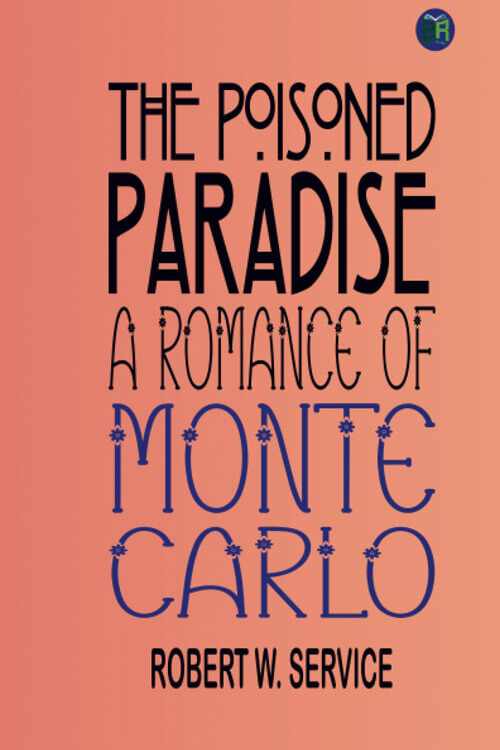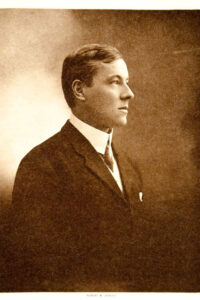
The Poisoned Paradise, A Romance of Monte Carlo
The boy was sitting in a corner of the shabby room. The mother watched him from her pillow.
“What are you doing, dear?”
“Drawing, Mother Lovely.”
“Strange! Always drawing. Did I ever tell you that your father was an artist?”
The boy looked at her thoughtfully. His eyes were like her own, dark and velvety; but his sunny hair contrasted with her black braids.
“No, Mother Lovely. Had I a father?”
“Yes, dearest. He died just before you were born. I came here hoping that his people, so rich, so proud, would be glad to see you. But, no, they cannot understand…. We’ll go home together, you and I, to my home.”
“Where is that, Mother?”
“Monaco, the great rock that rises from the sea, where my family has lived for generations. Listen, little son … if I should not be able to go with you, you must go alone. You will find the house where lives my mother, a plain, quiet house with brown shutters near the Cathedral. In front four pepper trees shield it from the sun, and through the pines, one can see the blue glimmer of the sea….”
“Is it beautiful, my mother?”
“Always beautiful. The people sing from very joy. In the garden of the Prince, just in front of our house, there is a broken pillar covered with ivy. Besides it is a spring where flowers bloom even in the summer heat. It was there we used to meet, your father and I…. Ah! I have never regretted it, never….”
Her girlish face was as sweet as a flower, but her eyes held memories too tragic for tears.
Then the door opened and a woman entered with a masterful air.
Read or download Book
Robert W. Service
Robert William Service (16 January 1874 – 11 September 1958) was a British-Canadian poet and writer, often called “the Bard of the Yukon”. Born in Lancashire of Scottish descent, he was a bank clerk by trade, but spent long periods traveling in the west in the United States and Canada, often in poverty. When his bank sent him to the Yukon, he was inspired by tales of the Klondike Gold Rush, and wrote two poems, “The Shooting of Dan McGrew” and “The Cremation of Sam McGee”, which showed remarkable authenticity from an author with no experience of the gold rush or mining and enjoyed immediate popularity. Encouraged by this, he quickly wrote more poems on the same theme, which were published as Songs of a Sourdough (re-titled The Spell of the Yukon and Other Verses in the U.S.), and achieved a massive sale. When his next collection, Ballads of a Cheechako, proved equally successful, Service could afford to travel widely and live a leisurely life, basing himself in Paris and the French Riviera.
Partly because of their popularity, and the speed with which he wrote them, his works were dismissed as doggerel by the critics, who tended to say the same of Rudyard Kipling, with whom Service was often compared. This did not worry Service, who was happy to classify his work as “verse, not poetry”.
Writing
Robert Service wrote the most commercially successful poetry of the century. Yet his most popular works “were considered doggerel by the literary set.” During his lifetime, he was nicknamed “the Canadian Kipling.” – yet that may have been a double-edged compliment. As T. S. Eliot has said, “We have to defend Kipling against the charge of excessive lucidity,” “the charge of being a ‘journalist’ appealing only to the commonest collective emotion,” and “the charge of writing jingles.” All those charges, and more, could be levelled against the Service’s best-known and best-loved works.
Certainly Service’s verse was derivative of Kipling’s. In “The Cremation of Sam McGee”, for instance, he uses the form of Kipling’s “The Ballad of East and West”.
In his E. J. Pratt lecture “Silence In the Sea,” critic Northrop Frye argued that Service’s verse was not “serious poetry,” but something else he called “popular poetry”: “the idioms of popular and serious poetry remain inexorably distinct.” Popular poems, he thought, “preserve a surface of explicit statement” – either being “proverbial, like Kipling’s ‘If’ or Longfellow’s ‘Song of Life’ or Burns’s ‘For A’ That’,” or dealing in “conventionally poetic themes, like the pastoral themes of James Whitcomb Riley, or the adventurous themes of Robert Service.”
Service did not call his work poetry. “Verse, not poetry, is what I was after … something the man in the street would take notice of and the sweet old lady would paste in her album; something the schoolboy would spout and the fellow in the pub would quote. Yet I never wrote to please anyone but myself; it just happened. I belonged to the simple folks whom I liked to please.”
In his autobiography, Service described his method of writing at his Dawson City cabin. “I used to write on the coarse rolls of paper used by paper hangers, pinning them on the wall and printing my verses in big charcoal letters. Then I would pace back and forth before them, repeating them, trying to make them perfect. I wanted to make them appeal to the eye as well as to the ear. I tried to avoid any literal quality.”
One remarkable thing about both of Service’s best-known ballads is how easily he wrote them. When writing about composing “The Shooting of Dan McGrew”, ‘easy’ was exactly the word he used: “For it came so easy to me in my excited state that I was amazed at my facility. It was as if someone was whispering in my ear.” And this was just after someone had tried to shoot him. He continued: “As I wrote stanza after stanza, the story seemed to evolve itself. It was a marvelous experience. Before I crawled into my bed at five in the morning, my ballad was in the bag.”
Similarly, when he wrote “The Cremation of Sam McGee”, the verses just flowed: “I took the woodland trail, my mind seething with excitement and a strange ecstasy…. As I started in: There are strange things done in the midnight sun, verse after verse developed with scarce a check … and when I rolled happily into bed, my ballad was cinched. Next day, with scarcely any effort of memory I put it on paper.”






